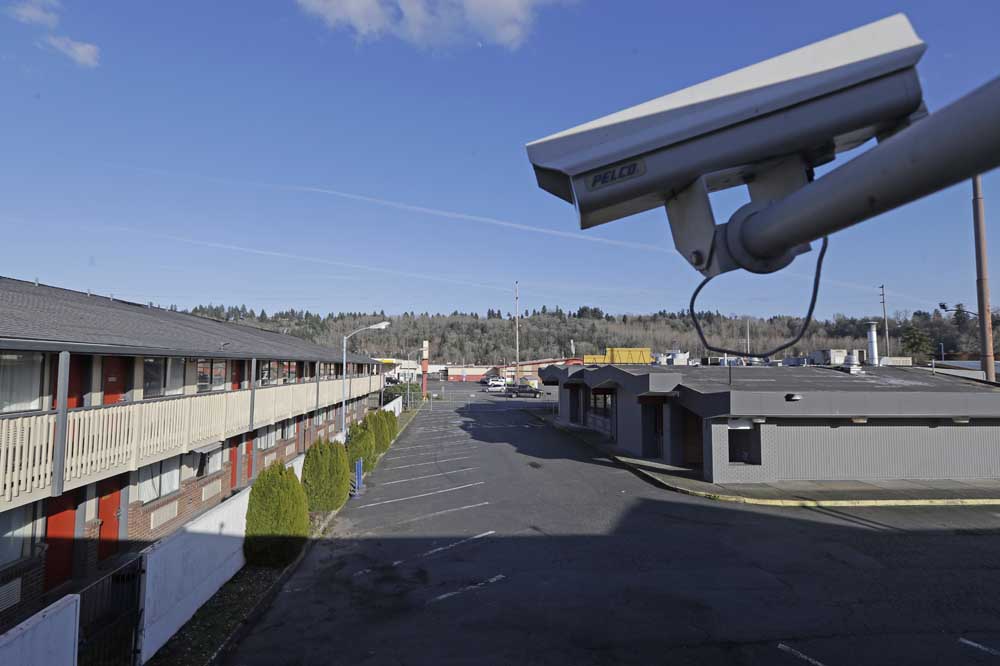Bend Police Department asks residents to join security camera network
Published 12:45 pm Monday, February 10, 2025

- In this March 4, 2020, file photo, a security camera is shown on the second floor of a row of rooms at a motel in Kent, Wash.
Bend Police are asking members of the public to register their private security cameras in an effort to boost crowd-sourced street monitoring and law enforcement.
The video mapping project is already in place and as of Friday had around 230 cameras registered, around 100 more than on Thursday when Bend Police announced the project in a release. Some of these cameras are owned by the city in downtown locations but an increasing number are privately owned cameras in neighborhoods around Bend.
The project, known as Connect Bend, is only accessible by Bend Police Department users. Registered users can unsubscribe from the registry and change or delete their information at any time.
Sheila Miller, a spokesperson for Bend Police, says the map used by police shows the location of body cameras used by police officers as well as the stationary cameras. It is designed to help police solve crimes, find missing children or conduct other police activity in an efficient manner.
“It has a lot of usability. This is a way for members of the public to register their cameras if they want to,” said Miller.
The technology behind the project, from a company called Fusus, allows police agencies to map out the location of private cameras registered with its network. Police can contact the owner of the camera, ask them to review video from a specific time and date, and request sharing of information from the video.
Fusus is the same company that provides Bend Police with integration of its body-worn camera system for officers. The full Fusus suite – which includes camera integration, body-worn camera integration and tracking, incident management and camera registry, costs Bend Police $75,000 a year, Miller said.
While the project may trigger worries of an Orwellian future, Miller says registration does not automatically give police direct access to a camera and its main purpose is to provide police with the knowledge that a camera exists at a particular location. Camera owners may decline sharing video from their camera if asked, she said.
“It is just a way for us to know where cameras are that have owners who are willing to work with us,” Miller said.
The system is not without its critics. Albert Fox Cahn, founder of the Surveillance Technology Oversight Project in New York, told Reuters in 2023 that Fusus is helping smaller American communities mimic the surveillance models of big cities, “bringing the surveillance city to the suburbs.” That, he and other critics say, brings with it myriad privacy and civil rights concerns, Reuters reported.
Another option available for users of advanced camera systems is to purchase a small device that plugs into the camera, allowing police to have conditional access to camera feeds. Taking this step would create additional investment as the plug-in device costs around $350. Miller said business owners are more likely to pay for this option rather than private homeowners.
“It wouldn’t be a full feed. Our officers wouldn’t just run a 24/7 video feed of, say, Walmart. But we could access it depending on the business owners’ privacy settings and their comfort level. So we could turn it on during an active threat incident, for example.”
A number of police departments across the country already use the Fusus camera registry system, including Atlanta, Washington D.C. and Campbell, California. Miller describes Bend Police Department as “lean” and said utilizing technology can improve police work without adding additional staff.
Typically when a crime is committed in an area, police will canvas a neighborhood asking people if they have video footage. Registering a camera allows police to more quickly identify where cameras are located without having to make door-to-door inquiries.
“Most people in our community trust our department and want to be helpful when there is a crime in their area… This is a way for them to help,” said Miller.
Miller said the technology can help save time when officers respond to an emergency. In a situation where a child goes missing, a desk officer can contact people in the neighborhood and determine which direction the child is headed if multiple people in the area have a camera.
“It is just more effective and could prevent us from losing a kid or taking a really long time to find a kid,” she said. “It’s a way to be more efficient with our time.”
For those who want to register an existing home camera, the process can be done through a secure portal and is free. Registration can be done at bendconnect.org.






